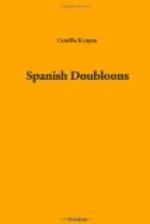“First do us the honor to be seated, Senor Gonzales.”
Comfortably bestowed in a camp-chair in the shade, the Spaniard resumed:
“My friend, this island belongs, as of course you are aware, to the republic of which I have the honor to be a citizen. All rights and privileges, such as harvesting the copra crop, are strictly conserved by the republic. All persons desiring such are required to negotiate with the Minister of State of the Republic. And how much more, when it is a question of treasure—of a very large treasure, Senor?”
The Scotchman’s face was dark.
“I had understood,” he replied, without looking in the direction of Miss Higglesby-Browne, who seemed in the last few moments to have undergone some mysterious shrinking process, “that negotiations in the proper quarter had been undertaken and brought to a successful conclusion—that in short we were here with the express permission of the government of Santa Marina.”
This was a challenge which Miss Browne could not but meet.
“I had,” she said hoarsely, “I had the assurance of a—a person high in the financial circles of the United States, that through his—his influence with the government of Santa Marina it would not be necessary—in short, that he could fix the President—I employ his own terms—for a considerable sum, which I—which my friend Miss Harding gave him.”
“And the name of this influential person?” inquired the Santa Marinan, suavely.
“Hamilton H. Tubbs,” croaked Miss Browne.
Senor Gonzales smiled.
“I remember the name well, madam. It is that of the pretended holder of a concession from our government, who a few years ago induced a number of American school-teachers and clergymen and other financially innocent persons to invest in imaginary coffee plantations. He had in some doubtful fashion become possessed of a little entirely worthless land, which formed the basis of his transactions. His frauds were discovered while he was in our country, and he was obliged to leave between two days, according to your so picturesque idiom. Needless to say his application for permission to visit Leeward Island for any purpose would instantly have been refused, but as a matter of fact it was never made.”
In a benumbed silence we met the blow. The riches that had seemed within our grasp would never be ours. We had no claim upon them, for all our toil and peril; no right even to be here upon the island. Suddenly I began to laugh; faces wearing various shades of shocked surprise were turned on me. Still I laughed.
“Don’t you see,” I cried, “how ridiculous it all is? All the time it is we who have been pirates!”
The Spaniard gave me a smile made brilliant by the gleam of smoldering black eyes and the shine of white teeth.
“Senorita, with all regret, I must agree.”
“Miss Virginia Harding,” said Miss Browne with all her old severity, rejuvenated apparently by this opportunity to put me in my place, “would do well to consult her dictionary, before applying opprobrious terms to persons of respectability. A pirate is one who commits robbery upon the high seas. If such a crime lies at the door of any member of this expedition I am unaware of it.”




